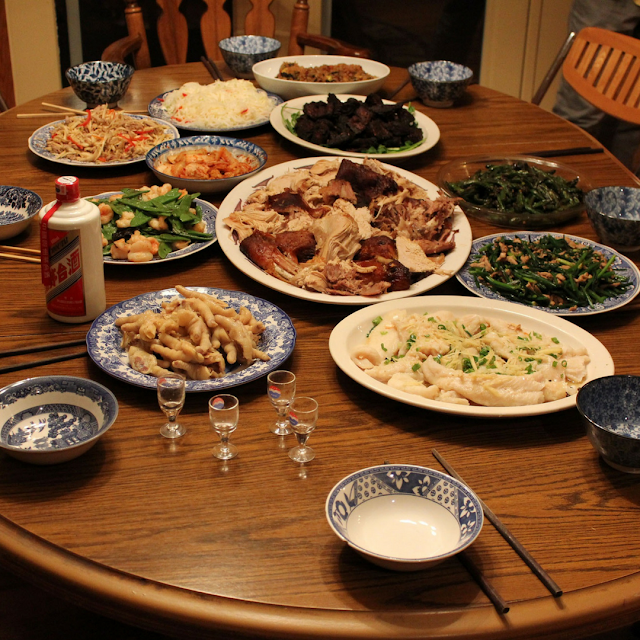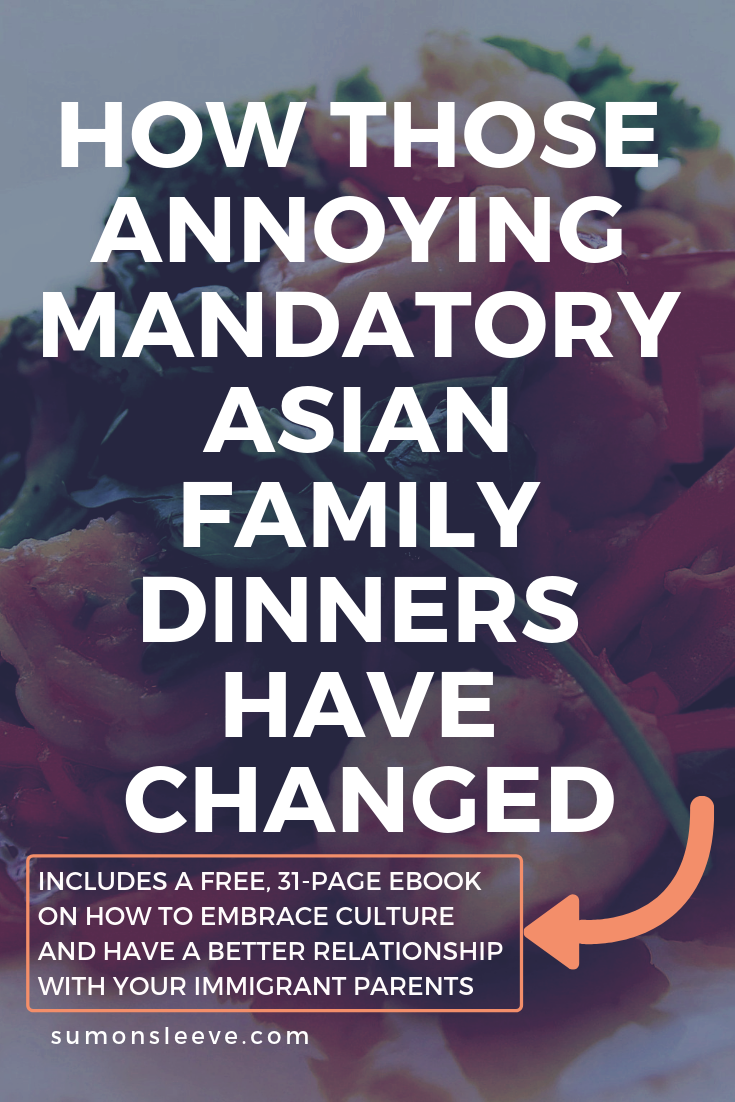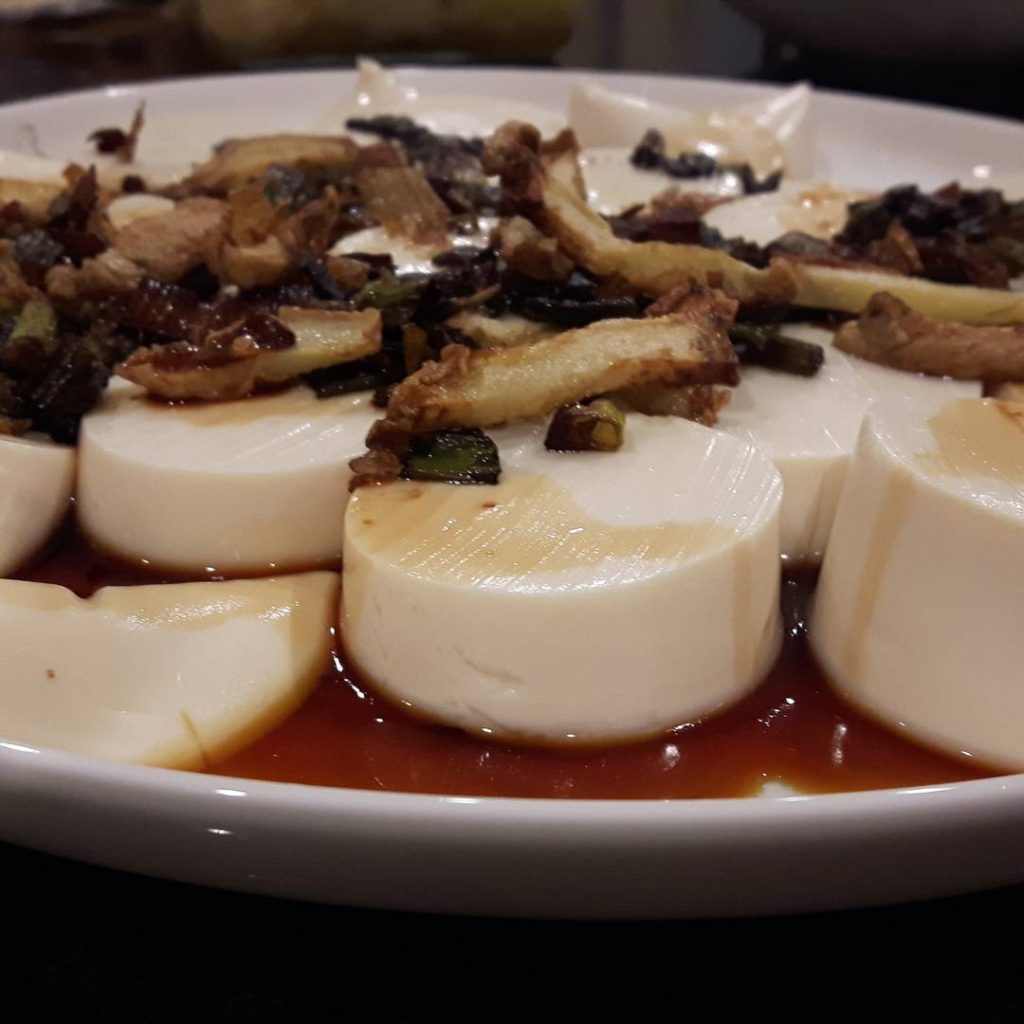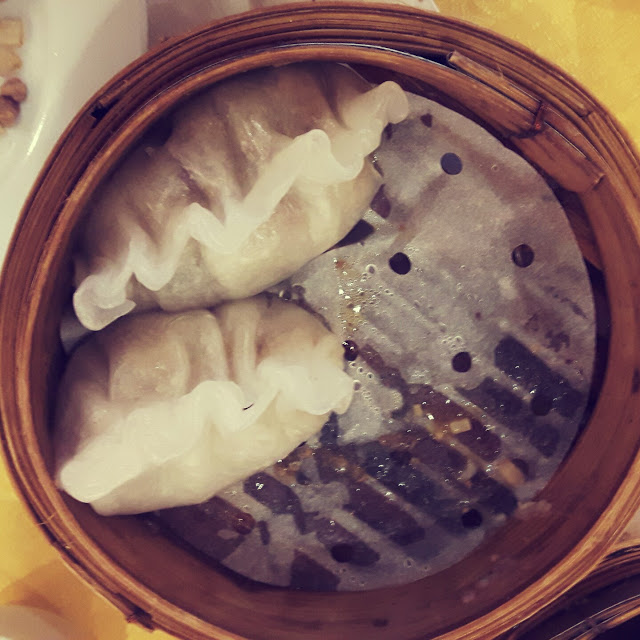
It’s my time to reflect on those sometimes annoying, mandatory Chinese family dinners growing up and how they’ve changed as I got older.
**Click Below To Listen**
So I’ve known how to make food for myself since I was very little, like elementary school times. I remember when I was 8, I would go to the kitchen, grab myself an apple, a serrated knife and start cutting it into slices (I guess my parents didn’t quite childproof the kitchen or is that a normal thing?).
 I’d put them on a plate and then start eating them while watching Rocko’s Modern Life. The apple slices turned into sugar cookies, then lasagna and then whatever I saw on the Food Network (I was the kind of teen who took notes during Christine Cushing Live. This was before I could look up recipes on my phone okay?).
I’d put them on a plate and then start eating them while watching Rocko’s Modern Life. The apple slices turned into sugar cookies, then lasagna and then whatever I saw on the Food Network (I was the kind of teen who took notes during Christine Cushing Live. This was before I could look up recipes on my phone okay?).
I cook fast and I’m very efficient. So when I became a mom, the whole dinnertime part wasn’t that bad until one night.
I come home, daughter in my left arm (having picked her up from Gong Gong Por Por’s after work) and my purse in the other (I swear I can bicep curl a cow with my just left arm). I put her down and open the fridge. I had made beef tomato with egg and stir-fried green beans from the night before.
There was just enough for the three of us but there were no carbs to go with it. So I decided to boil some macaroni and steam some dumplings to complement the meal.
My husband comes home and we start eating dinner. There are 2 dumplings left. I’m stuffed. My husband’s full. My daughter’s playing with a piece of macaroni and making art with it.
I started feeling angry at my husband for saying no to more dumplings (FYI: He wanted me to let you guys know he’s a big eater and considers himself a Dumpling King; he merely had a big lunch that day.). I’m frustrated I can’t eat another bite.
I’m upset that my daughter’s pushing away the dumpling that I put on her tray. I started wondering why am I feeling this way? Why am I tempted to start a fight with my husband about how I worked all day, did the drop-off and pick up, rushed home to make him dinner and now he doesn’t appreciate my efforts?
I have a certain pride in estimating the
But so what if I made 2 dumplings too many?They can go in a container and be someone’s tasty snack the next day.
I was scratching my head. Does this stem from my history of perfectionism?
I started digging deep.

It’s customary in the Chinese culture to make more than enough when preparing food for a group. It can be offensive to the cook if there are no leftovers since the more people eat, the more their efforts are validated. If there are empty plates, that meant they didn’t estimate properly how much people could eat and it can be embarrassing.
I know my mom cooks more than enough for everyone. I can always count on bringing food home every time we have dinner at my parents. So by having leftovers that night, am I internally rejecting my culture since I don’t agree with that etiquette? No.
It was more about my feelings of telling people how much they should eat and that brought back childhood nightmares memories. Growing up in a Chinese family, we often had dinner together.
This could be with my immediate family or during special occasions, it would be with external family members and friends. The conversation around the dinner table would often be about who has eaten more or who has eaten less.
Then it would be about who should eat more and who should eat less and why. This drives the conversation towards who is skinny and should eat more, and who is fat and should eat less.
Age also mattered in who should eat more or less. Young people should eat more and old people should eat less. Because the adults were leading the conversation, the size of the young people frequently became a dinner topic.
It was like open season on our physical appearance as the Lazy Susan plays Russian Roulette with who will get the most offended and who will be the first to bite their tongues into a bloody pulp (as they hold back their instincts to “Faan Toi” ie. flip table).
And if there was more than 1 young person at the dinner, comparisons would be made as to who was taller, shorter, fatter, thinner, darker, lighter, smarter, dumber and so on.
As I reflect back on these conversations, why were they (including my own parents until one day I “Faan

That’s how they grew up and that’s what their parents did to them. So they honestly think it’s a normal thing to talk about. Talking about their children’s physical appearance is a common thing to do because their parents did that to them.
There is absolutely nothing else to talk about among the adults so they start making observations and narrate what everyone is doing. They have run out of topics and they see their kids sitting quietly around the table so they have a go at them instead of embracing some silence.
Wow look at Albert over there, eating up a storm. This is his 3rd piece of chicken for such a growing young boy. Look at how big he has gotten.
Oh look at how little Sandy is eating. She must be trying to lose weight for her ballet performance next week.”
How much does she weigh now? Does she weigh less than her younger sister, Karen? She must be.
Look at their arms. Sandy’s arms look much thinner than Karen’s. But Karen’s skin is lighter and her eyes are bigger than Sandy’s.
Since there is often a relationship gap between Chinese kids and their parents, the kids don’t tend to tell their parents that their appearance is none of their business.
I’m obviously stereotyping Chinese families but how come these kids are often seen as good kids, soft-spoken, polite, respectful of their elders, does well in school and never talks back?
There’s a common perspective that Chinese (and other Asian) parents are very strict and conservative. So when dinnertime rolls around, the adults dictate the conversations.
The children sit quietly, possibly reading a book or playing their game, while their parents either ramble off about all things untrue about their kids and/or they start comparing the kids.
And the comparisons can be from grades, to how well/poor their kid did in some musical performance, their weight and other physical characteristics. You know, because their children are objects and they haven’t actually had a real conversation with them.
The child is so closed off from their parents, they don’t share anything with them. These kids develop internal mechanisms to shut off their listening skills at dinner so their parents can talk about them in front of them without evoking a single emotion.
Instead of talking back to the adults around the table, they passively absorb the comments and eat their food, waiting for the bill to get paid or permission to leave.
hmm…I wonder if this type of upbringing contributes to why Asians often lack boardroom presence during work meetings, limiting upward movement in their careers. Bamboo Ceiling anyone?
So I mentioned earlier that I “Faan Toied “.
I was in high school when I told my parents about my eating disorder and mental health issues. I don’t exactly remember when but it was around the time I was starting to recover and had the courage (and confidence) to be vulnerable with my parents.
I told my dad his comments about my size and how much/little I ate did not help my situation. I told my mom that her obsession with weight made me feel insecure. I needed to tell them because I wanted them to know that their words had consequences.
They didn’t judge me. They didn’t discipline me. They didn’t show signs of disappointment or shame or embarrassment. They listened and nodded.
My mom stopped talking about diets, weight and sizes with me from that day on. She started standing up for me during dinner conversations.
My dad apologized (which can be difficult for a traditional, Chinese man with slight misogynistic tendencies) and said he will never make those comments ever again (not just to me but to anyone).
“As I grew up, I continued to include them in my life. Just like those 2 dumplings, they weren’t left behind.”
From that point forward, my relationship with my parents changed for the better.
There was mutual trust between us that didn’t exist before our conversation. I believe that by confronting them, I revealed my level of maturity and they respected that. I started sharing everything and anything that was going on in my life with them.
I told them where I was going.
I told them who I was dating.
I told them who all my friends (new and old) were.
I told them when I was hungover.
I told them when I partied too hard.
I told them where I was when I wasn’t coming home.
I told them what I wanted to do in life and how I was going to get there. I told them about my relationship issues.
I told them when I skipped class and needed a mental health day for myself.
They knew what my hopes, dreams and fears were.
In return, they shared with me their stories of reckless behaviour, good and bad decisions, past relationships before they met each other, challenges (and fears) of parenting us, their vision of how they want to their life to be like (expectation versus reality) and so forth.
As I transitioned from being a teen to an adult, I continued to include them in my life. Just like those 2 dumplings, they weren’t left behind. I can’t possibly estimate the amount of love I have for them as they do for me (just like the love I have for my husband and daughter).
As tears retreated back into my tear ducts, I took the dumpling from my daughter’s tray and the other from my husband’s plate, put them in a container and into the fridge. I said to myself, “I can’t wait to eat you with some black vinegar tomorrow”.




